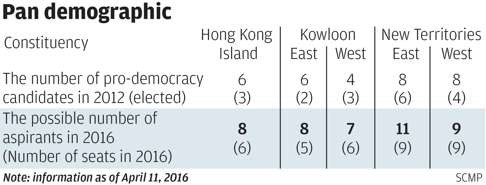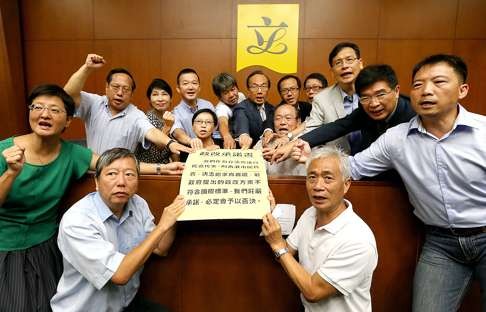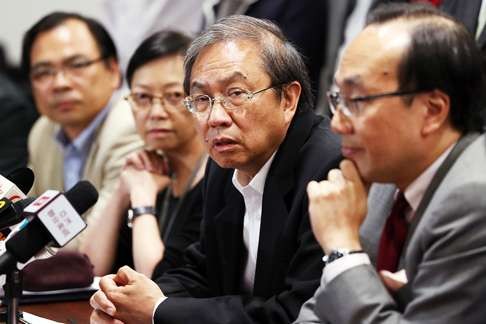
Hong Kong’s new pro-democracy groups pose new problems for traditional pan-democrat camp
Young parties affect electoral arithmetic ahead of Legislative Council polls

The emergence of new political groups led by young activists is set to shake up the political landscape of Hong Kong, with traditional pan-democrats trying to lay the safest bet in the upcoming Legislative Council elections amid increasingly strong competition.
According to a tally by the Post, voters from the New Territories East in favour of pro-democracy candidates could choose from as many as 11 slates in September – compared to eight candidates four years ago – despite only nine seats being up for grabs.
A similar situation could be found in Kowloon East, where at least eight pro-democracy aspirants are in a fight for five seats – not to mention their strong counterparts from the Beijing-friendly camp, that won three of them in 2012.
Post-Occupy group Youngspiration and Demosisto, a party formed by student activists who co-led the sit-ins, have both pledged to field candidates in the September polls in a bid to bring their cause of advocating the city’s right to self-determination onto the agenda.
Pro-independence Hong Kong National Party and Hong Kong Indigenous, whose member Edward Leung Tin-kei secured about 16 per cent of votes in the February by-election in New Territories East, also plan to enter.
The soaring number of candidates had prompted the Democratic Party to adopt a less progressive, but safer, approach.
In its annual general meeting last December, some Democrats proposed fielding two lists of candidates separately in both New Territories East and West.

They currently have one representative in the former, but none in the latter.
The two lists of Democrats garnered 58,684 votes in New Territories West four years ago, more than enough to return one candidate, but the vote allocation left them with nothing.
“The political landscape has already changed, with a wider spectrum. I don’t think the Democratic Party could secure two seats [in New Territories East and West] even though they had enough votes for that in past elections,” said Kelvin Lai King-wai, an executive member of the party’s New Territories West branch, adding he would lobby his colleagues to avoid any risky moves.
It was understood that the two New Territories branches would meet over the weekend, when the members would most likely endorse a plan to field only one list of candidates in each constituency.
Their suggestion would then be scrutinised by the party’s central committee next Thursday and be voted by all members in the general meeting on April 24.

Separately, the League of Social Democrats and People Power, both considered the radical pan-democrats, have also fostered closer coordination to avoid direct clashes in the polls.
Political scientist Professor Ma Ngok, of the Chinese University, said the pro-democracy candidates might all suffer the same fate amid infighting, even under proportional representation.
“Only 60 per cent [of the electorate] are pro-democracy voters at most. It would already be a very different picture if the same pool of votes, which used to be shared by eight candidates, be divided by 11,” he said, adding it was too soon to say who would be most affected.

Professor Joseph Cheng Yu-shek, of the Power of Democracy, which coordinates pan-democrats’ election plans, said it was a “rather difficult situation” this year, calling it “transitional pain”.
It was easier to avoid clashes in the district council elections, which use the “single seat-single vote” and “first-past-the-post” systems, he said, as it was absolutely clear that splits within the camp would only hand victory to the opponents.
“But it is different in the Legco election, he said.
“Some parties might ask why certain candidates cannot run together. [They believe] the candidates can both win.”
The Power of Democracy had maintained a dialogue with the new groups to enhance mutual understanding and trust, Cheng added.